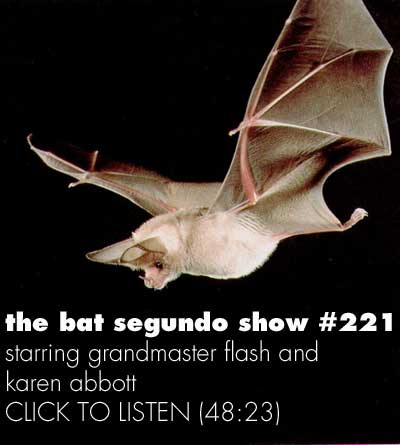Grandmaster Flash and Karen Abbott appeared most recently on The Bat Segundo Show #221.
Grandmaster Flash is most recently the author of The Adventures of Grandmaster Flash (with David Ritz).
Karen Abbott is most recently the author of Sin in the Second City.

Condition of the Show: Marinating in urban culture.
Authors: Grandmaster Flash and Karen Abbott
SUBJECTS DISCUSSED: Using “adventures” in a book title, cutting, rubbing and scratching, finding obscure records in a digital age, turntables vs. mashups, time-coded vinyl, illicit methods of obtaining equipment, Sylvia Robinson, the risks of entering into a deal without an attorney, Flash’s problems with “The Message,” Ray Chandler, “Getting Everleighed,” bawdy verbs in desuetude, research and literary associations, the swank decor of the Everleigh Club, the legendary attorney Colonel MacDuff, determining reliable sources a century later, Clifford Roe and Ernest Bell, the danger of writing a history with clear-cut protagonists and antagonists, the white slavery scare, maintaining high standards in prostitution, balancing the pursuit of the facts with the writing an entertaining book, the reformist tendency to slum in the Red Light District, Ike Bloom and graft money, filling in the missing pieces of the narrative constructed by the Everleigh sisters, the Everleigh sisters’s idiosyncratic grammar, whether Abbott portrayed Vic Shaw in a fair light during her final days, Bathhouse John Coughlin — the buffoon and poet laureate of the Levee District, Clement Moore, the early days of Al Capone, the rush of reformist regulation before the 1920s, Jack Johnson, needless persecution under the Mann Act, the lack of coordination between federal and local authorities, the early days of the FBI, the 1908 bombing of the Coliseum, speculation on why the wondrous debauchery of the First Ward Ball were stopped, the downside of advertising a brothel, insular zoning, and prognosticating on the motivations of reformers going after the Everleigh Club.
EXCERPTS FROM SHOW:
 Corresponent: If you listen to “The Wheels of Steel” today, as I have actually a couple of times, you can actually hear your hands on the turntables, whereas you can’t always hear someone who is just doing a mashup. You don’t hear that analog quality. So I’m wondering how things have adjusted for you in light of this. How do you keep the analog part of things legitimate? Real? How do digital tools help you as well?
Corresponent: If you listen to “The Wheels of Steel” today, as I have actually a couple of times, you can actually hear your hands on the turntables, whereas you can’t always hear someone who is just doing a mashup. You don’t hear that analog quality. So I’m wondering how things have adjusted for you in light of this. How do you keep the analog part of things legitimate? Real? How do digital tools help you as well?
Flash: Okay, first of all, I’m a scientist before I’m a DJ. So pushing the envelope for new technology, I’m always with that. Because I was ahead of my time thirty-three years ago. So now that it’s become things like Serato, Torq, FinalScratch — Traktor Scratch, which is what I use — you still have to drive it in the same fashion. Meaning that if you were a great mixer, a great DJ, in the analog world with vinyl, you still have to drive it the same way in digital. So if you was wack in the analog world, you will be wack in the digital world. So the real fact of the matter is follow through how you play your songs and what songs you play. That still separates the boys from the men, and the ladies from the women. So the modern technology has brought in convenience. You can put 15,000, 20,000 songs on a hard drive, and carry those. Where at one point, we as DJs used to have three or four guys who used to lift our boxes. That isn’t the case anymore. I carry less vinyl and I have more in my laptop.
* * *
 Correspondent: It’s interesting that something like “Everleighed,” as well as “decentized,” which you point to later in the book — these are verbs that didn’t quite make it in the 21st century.
Correspondent: It’s interesting that something like “Everleighed,” as well as “decentized,” which you point to later in the book — these are verbs that didn’t quite make it in the 21st century.
Abbott: “Decentize.” I’m surprised. You’d think that some reformers today would have latched onto it.
Correspondent: You’d think in light of the fundamentalist furor that is going on as we speak. But how much of your research is oriented around these associations? Because obviously, this is a very literary approach in a certain way to the facts that exist. There’s a lot of fanciful language that you use that really gets us into this atmospheric context. I’m wondering. Does something like this originate from the facts? Or does it originate from a phrase? Or does it originate from a verb as we sort of suggested here?
Abbott: You know, I think a lot of the phrases that exist in the book were already in existence. The characters sort of latched onto them. I’m kind of ashamed to admit that I spent two days researching the etymology of Susie Poontang.
Correspondent: Really?
Abbott: Of where “poontang” might have come from.
Correspondent: Well, did you come up with any conclusions here?
Abbott: It was a Chinese phrase that had to do with prostitutes. And I think she had to latch onto that for herself. It’s sort of a chicken and the egg question. But I’m sure that she probably appropriated it for herself to get to America.
(Please note: Due to current incompatibility between PodPress and WP 2.6, I have had to institute a workaround. If the player button does not work, then try the direct link to the MP3 below.)
BSS #221: Grandmaster Flash & Karen Abbott


 Corresponent: If you listen to “The Wheels of Steel” today, as I have actually a couple of times, you can actually hear your hands on the turntables, whereas you can’t always hear someone who is just doing a mashup. You don’t hear that analog quality. So I’m wondering how things have adjusted for you in light of this. How do you keep the analog part of things legitimate? Real? How do digital tools help you as well?
Corresponent: If you listen to “The Wheels of Steel” today, as I have actually a couple of times, you can actually hear your hands on the turntables, whereas you can’t always hear someone who is just doing a mashup. You don’t hear that analog quality. So I’m wondering how things have adjusted for you in light of this. How do you keep the analog part of things legitimate? Real? How do digital tools help you as well? Correspondent: It’s interesting that something like “Everleighed,” as well as “decentized,” which you point to later in the book — these are verbs that didn’t quite make it in the 21st century.
Correspondent: It’s interesting that something like “Everleighed,” as well as “decentized,” which you point to later in the book — these are verbs that didn’t quite make it in the 21st century.